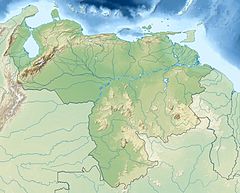Piedra La Tortuga Natural Monument
| Piedra La Tortuga Natural Monument Monumento Natural Piedra La Tortuga | |
|---|---|
 | |
| Location | |
| Coordinates | 5°33′N 67°35′W / 5.550°N 67.583°W |
| Area | 5.25 km2 (2.03 sq mi) |
| Established | June 5, 1992 |
The Piedra La Tortuga Natural Monument[1] (Spanish: Monumento Natural Piedra La Tortuga) Also Piedra La Tortuga Is a protected natural space located in the Atures municipality, in the Amazonas state,[2] in the south of Venezuela.[3] Received the status of natural monument[4] by decree No. 2.351 of June 5, 1992. Official Gazette No. 35089 of November 11, 1992.
It is located 15 km, approximately from Puerto Ayacucho, heading South. Municipality Atures. Covering 525 hectares, it is home to two indigenous communities of the Hiwi (Guahiba) and Piaroa or Wothuha ethnic groups.
It consists of two granite outcrops of magmatic origin, belonging to the Serrania del Parhuaza, constituted by acid rocks of the Precambrian of magmatic origin, with an approximate age of 1,500 million years. Here is the largest petroglyph known in the country, as well as caves and cemeteries of ancient indigenous populations, with a great variety of cave paintings.
Gallery
[edit]-
Panoramic view
-
-
Walk to the monument
-
Caves
See also
[edit]References
[edit]- ^ Monumento Natural Piedra La Tortuga
- ^ Estado actual del conocimiento de la flora en Venezuela (in Spanish). Ministerio del Ambiente y de los Recursos Naturales Renovables. 1998-01-01. ISBN 9789800411636.
- ^ Porembski, Stefan; Barthlott, W. (2012-12-06). Inselbergs: Biotic Diversity of Isolated Rock Outcrops in Tropical and Temperate Regions. Springer Science & Business Media. ISBN 9783642597732.
- ^ Rangel, Román (2002-01-01). Venezuela, una joya para el mundo (in Spanish). BPR Publishers. ISBN 9789800786420.





